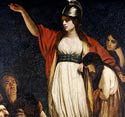(Boudica also spelt as Boudicca, Boudicea and Boadicea)
Boudica was a famous queen of ancient Britain who led a rebellion against the Roman occupiers.
 Boudica was born in 30 AD in South East England. Around CE 48, she married Prasutagus, the head of the Iceni tribe in south East England. They lived in Norfolk and, during the life of Prasutagus, were given semi independence from the Roman occupiers. Prasutagus was given the freedom to remain King of the Iceni, but under the dominion of Rome. Despite some advantages of Roman rule, the Iceni people suffered many indignities such as slavery and high taxes.
Boudica was born in 30 AD in South East England. Around CE 48, she married Prasutagus, the head of the Iceni tribe in south East England. They lived in Norfolk and, during the life of Prasutagus, were given semi independence from the Roman occupiers. Prasutagus was given the freedom to remain King of the Iceni, but under the dominion of Rome. Despite some advantages of Roman rule, the Iceni people suffered many indignities such as slavery and high taxes.
On the death of Prasutagus, Roman law meant the majority of his possessions would pass to the Roman Emperor. However, the local Roman commanders took this as a pretext to confiscate all the property of Prasutagus and other leading Iceni tribe members. Prasutagus had also run up debts during his lifetime and when his wife Boudica could not meet them, she was stripped and beaten in public. The Roman historian, Tacitus, wrote that Roman soldiers raped her daughters. Other tribes such as the Trinobantes were subject to similar treatment, leading to growing feelings of rebellion amongst the native Britons.
It was Boudica who was able to unite the various warring tribes of Briton and lead them in revolt against the Roman occupiers. The Roman writer Cassius Dio described Boudica as:
“very tall. Her eyes seemed to stab you. Her voice was harsh and loud. Her thick, reddish-brown hair flung down below her waist. She always wore a great golden torc around her neck and a flowing tartan cloak fastened with a brooch.” [2]
The first target for Boudica and the Britons was the Roman city of Colchester. This city stood as an emblem for Roman rule; it housed a temple to the Roman emperor Claudius. The city was lightly defended and the Britons had little trouble in raising the city to the ground. The Roman governor, Suetonius, was at the time fighting in Anglesey. When he heard the news he travelled to London, which was then a small but thriving financial centre. He considered defending London, but concerned over the growing number of rebellious Britons he left it only lightly armed. The Britons were thus were able to take London and later St Albans. Over 80,000 people were estimated to have been killed in the three cities. The Britons showed no mercy to those left behind.
“a terrible disaster occurred in Britain. Two cities were sacked, eighty thousand of the Romans and of their allies perished, and the island was lost to Rome. Moreover, all this ruin was brought upon the Romans by a woman, a fact which in itself caused them the greatest shame….But the person who was chiefly instrumental in rousing the natives and persuading them to fight the Romans, the person who was thought worthy to be their leader and who directed the conduct of the entire war, was Buduica, a Briton woman of the royal family and possessed of greater intelligence than often belongs to women.” [1]
Boudica now led her growing army north to meet Suetonius’ army. Along the way Boudica’s army were able to successfully ambush a Roman column of soldiers who were marching along a narrow path.
The two armies eventually met in open battle, possibly somewhere along Watling Street. The Britons heavily outnumbered the Roman forces, however the Romans had superior tactics, training, discipline and weapons. The Romans chose a narrow location, where the Britons could not use their superior numbers. The first wave of Britons was stopped with a wave of Roman Javelins. When the second wave came, the Romans held firm, behind their wall of shields, stabbing the Britons with the short sword. At the end of the Battle, only 400 Romans had fallen, but up to 200,000 Britons had been slaughtered. Conflicting reports suggest that Boudica, either took poison or died from her wounds.
Boudica gained a tremendous amount of interest in the Victorian period. The husband of Queen Victoria, Prince Albert, commissioned the statue of Boudica which stands outside the Houses of Parliament in London. Boudica, actually became a symbol of the British Empire, which is somewhat ironic given her anti imperialist stance.
The rebellion of Boudica, almost forced the Romans to leave England, but once quelled the Emperor Nero decided to replace Suetonius with a more neutral ruler Publius Petronius Turpilianus.
Most of the sources for Boudica’s time comes from Tacitus. His father-in-law, Agricola, was a military tribune under Suetonius Paulinus, which almost certainly gave Tacitus an eyewitness source for Boudica’s revolt.



No comments:
Post a Comment